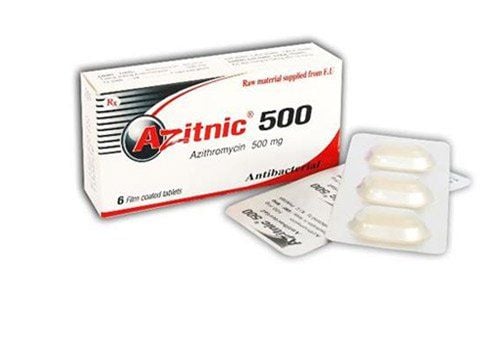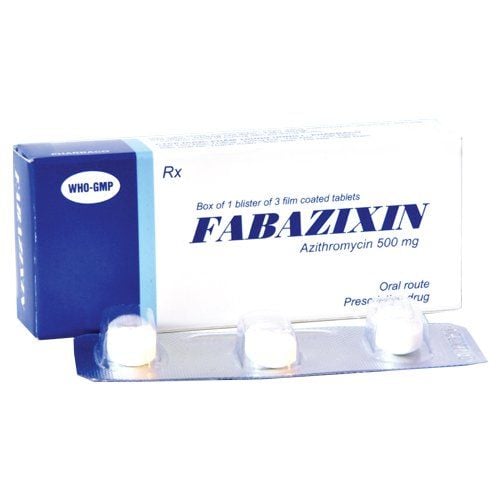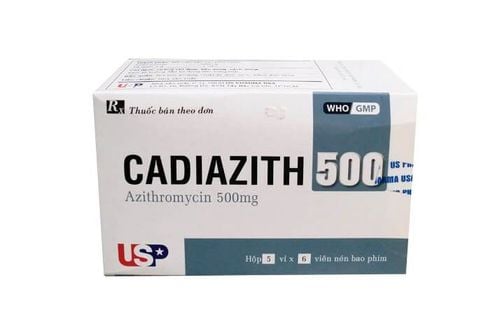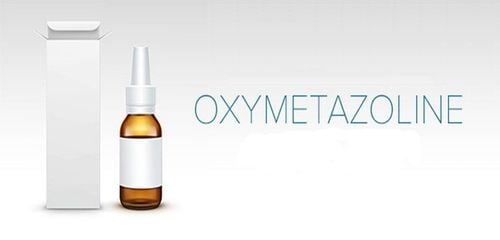This is an automatically translated article.
Maxazith is an antibiotic commonly prescribed in cases of bacterial infections causing otitis media, pharyngitis, respiratory tract infections, skin infections, urogenital infections caused by susceptible bacteria.1. What is Maxazith?
Maxazith has the main ingredient is Azithromycin - a semi-synthetic macrolide antibiotic (azalide). Azithromycin is a broad-spectrum antibiotic that works by binding to bacterial ribosomes, preventing their protein synthesis, thereby killing pathogenic bacteria. Maxazith has strong effect on standard gram-positive bacteria such as staphylococcus, Streptococcus, Clostridium perfringens, Corynebacterium diphtheriae, Pneumococcus, Peptostreptococcus,... The drug also has bactericidal effect on some gram-negative standards such as Moraxella catarrhalis, Haemophilus influenzae , parainfluenzae, Mycoplasma pneumoniae, Toxoplasma gondii,... After oral administration, the drug is widely distributed in the body but mainly into tissues in the lungs, tonsils, granulocytes, macrophages, prostate gland, high in in the blood but low concentrations on the central nervous system; Peak plasma concentrations are reached in 2 - 3 hours, bioavailability is about 37%. Maxazith is metabolised in the liver and is finally eliminated in the bile as unchanged drug.
2. Indications of the drug Maxazith
Maxazith is indicated for the treatment of the following infectious diseases:
Lower respiratory tract infections: Pneumonia, bronchitis, bronchitis,... Upper respiratory tract infections: Pharyngitis, inflammation nasopharyngitis, sinusitis, otitis media, tonsillitis,... Skin and soft tissue infections: cellulitis, boils, impetigo,... Non-gonococcal genital tract infections. Uncomplicated Chlamydia trachomatis infection in the genital tract.
3. Contraindications of the drug Maxazith
Maxazith should not be used in the following cases
Allergy to Azithromycin, macrolide antibiotics or any other ingredient of the drug. Do not use with ergotamine , bromocriptine . Note when using the drug Maxazith
Maxazith has the potential to cause allergies such as angioedema, so it is recommended to monitor the entire time of taking the drug. As with other broad-spectrum antibiotics, Maxazith can cause superinfection by non-susceptible organisms including fungi. Patients with renal failure with glomerular filtration rate <10ml/min should use the drug with caution. Maxazith is metabolized in the liver, so it is necessary to monitor liver function before and during dosing, especially in patients with severe hepatic impairment. Maxazith can cross the placenta and breast milk, safety has not been proven for children, so it should only be used by pregnant and lactating women when absolutely necessary.
4. Maxazith Drug Interactions
Some possible drug interactions when used in combination with Maxazith
Food reduces the bioavailability of the drug by up to 50% when taken at the same time. Erectile dysfunction and its derivatives can cause toxicity when taken with Maxazith. Antacids must be taken at least 1 hour or after 2 hours if Maxazith is being treated concomitantly. Maxazith changes the metabolism of Digoxin, Cyclosporin drugs, so it is necessary to monitor and adjust the dose accordingly. Monitor blood clotting time during treatment if coumarin-type anticoagulants (warfarin). Co-administration with Rifabutin reduces neutrophils. Dosage adjustment of the immunosuppressant cyclosporin when co-administered with Maxazith.
5. Dosage and usage
How to use:
Maxazith is prepared as a powder for oral suspension. Take it away from a meal (1 hour before or 2 hours after a meal) because food alters the bioavailability of the drug. Dosage:
Patients with upper and lower respiratory tract infections, skin and soft tissue infections: First day take 500mg/time/day; The next days take 250mg / time / day. Sexually transmitted diseases caused by infection with Chlamydia trachomatis, Neisseria gonorrhoeae or Haemophilus ducreyi: Take a single dose of 1g/time. Children under 12 years old: Take 10mg/kg/time/day for 3 days; Or the first day take 10mg/kg/time/day, the next days take 5mg/kg/time/day. Use the drug from 5 to 7 days, long-term use must be prescribed by a doctor. Children under 6 years of age are not indicated for use because safety has not been proven. No dose adjustment is required in patients with mild to moderate renal impairment (glomerular filtration rate 10 to 80 mL/min). Monitor carefully when administering to patients with glomerular filtration rate <10 mL/min. No dose adjustment of Maxazith is required in elderly patients and in patients with mild to moderate hepatic impairment. When using an overdose of the drug Maxazith may manifest symptoms such as nausea, vomiting, diarrhea, hearing loss. When detecting abnormal signs, stop using the drug immediately and go to the nearest medical facility. If a dose is missed, take it again as soon as possible. If it is almost time for the next dose, skip the missed dose and take the next dose as scheduled, do not double the prescribed dose.
6. Side effects of the drug Maxazith
Some unwanted effects may be encountered when using Maxazith.
Common side effects:
Indigestion, flatulence. Nausea, vomiting, abdominal pain, diarrhea. Tight abdominal muscles. Reversible hearing loss caused by high doses of Maxazith. Uncommon side effects:
Feeling of fatigue, drowsiness, somnolence. Headache, dizziness, vertigo. Sensitive to light. Taste disorders, vaginitis, nephrology - pyelonephritis. Rare side effects:
Allergic reactions, angioedema, pruritus. Decreased neutrophil count. Increased liver enzymes, cholestatic jaundice. Pseudomembranous colitis. In summary, Maxazith is a broad-spectrum antibiotic that must be prescribed by a doctor when used. The drug is active against many strains of Gram-negative and Gram-positive bacteria. However, do not overuse the drug to increase the rate of drug resistance or the occurrence of unwanted side effects.













